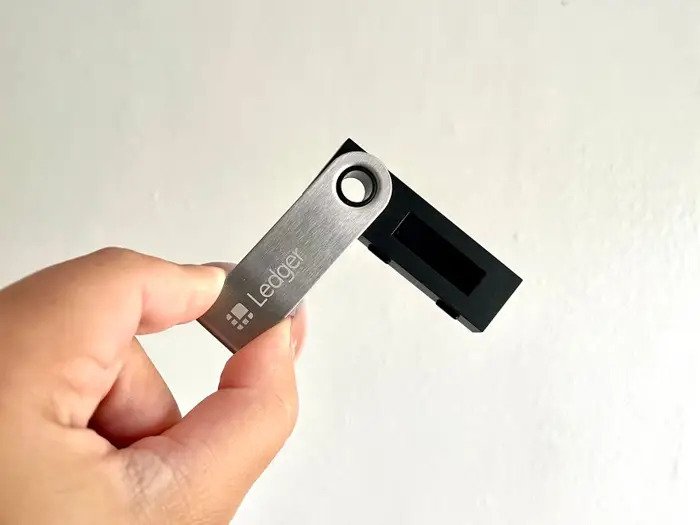How To Use A Crypto Hardware Wallet

A crypto hardware wallet is a physical device that stores your cryptocurrency private keys offline. This makes them much more secure than software wallets, which store your private keys on your computer or phone. Hardware wallets are also more resistant to malware and phishing attacks.
benefits of using a crypto hardware wallet
- Increased security: Hardware wallets are the most secure way to store your cryptocurrency. This is because they store your private keys offline, which means they are not accessible to hackers who gain access to your computer or phone.
- Peace of mind: Knowing that your cryptocurrency is safe and secure can give you peace of mind.
- Control over your funds: With a hardware wallet, you have complete control over your cryptocurrency. You are not reliant on any third party to store your funds.
- Support for multiple currencies: Most hardware wallets support a wide variety of cryptocurrencies.
- Easy to use: Hardware wallets are relatively easy to use. Most models come with a user-friendly interface that makes it easy to send, receive, and store your cryptocurrency.
- Portability: Most hardware wallets are small and portable, which makes them easy to take with you wherever you go.
popular crypto hardware wallets on the market
- Ledger Nano X: The Ledger Nano X is a popular hardware wallet that supports a wide variety of cryptocurrencies. It is also Bluetooth-enabled, which makes it easy to use with your smartphone.
- Trezor Model One: The Trezor Model One is another popular hardware wallet that is known for its security. It is easy to use and supports a wide variety of cryptocurrencies.
- Coldcard: The Coldcard is a hardware wallet that is focused on security. It is a bit more complex to use than some other hardware wallets, but it is also one of the most secure.
If you are considering investing in cryptocurrency, I highly recommend using a hardware wallet to store your private keys. This will help to protect your funds from hackers and other threats.
Hardware wallet vs Software wallet
Hardware and software wallets are both cryptocurrency wallets that allow you to store, send, and receive cryptocurrencies. However, they differ in their security features and how they are used.
Hardware wallets are physical devices that store your private keys offline, making them much more secure than software wallets. This is because they are not connected to the internet, so they cannot be hacked by malware or phishing attacks. Hardware wallets are also protected by a PIN code, so you can be sure that your private keys are only accessible to you.
Software wallets, on the other hand, are apps that you install on your computer or mobile device. They are less secure than hardware wallets because your private keys are stored on your device, which is connected to the internet. This makes them more vulnerable to hacking attacks. However, software wallets are more convenient to use than hardware wallets, and they are often free.
Here is a table that summarizes the pros and cons of hardware and software wallets:
| Feature | Hardware Wallets | Software Wallets |
|---|---|---|
| Security | Very secure | Less secure |
| Convenience | Less convenient | More convenient |
| Cost | More expensive | Often free |
So, which type of wallet is right for you? If you are storing a large amount of cryptocurrency, or if you are concerned about security, then a hardware wallet is the best option. However, if you are only storing a small amount of cryptocurrency, or if you need to access your funds frequently, then a software wallet may be a better choice.
Here are some additional factors to consider when choosing a wallet:
- The type of cryptocurrency you want to store
- The features you need
- Your budget
Once you have considered these factors, you can start researching different wallets and choose the one that is right for you.
Here are some of the most popular hardware wallets:
- Ledger Nano S
- Trezor Model T
- KeepKey
Here are some of the most popular software wallets:
- Exodus
- MetaMask
- Coinbase Wallet
How does a hardware wallet work
A hardware wallet is a physical device that stores your cryptocurrency private keys offline. This means that your private keys are never exposed to the internet, making them much more secure from hackers. Hardware wallets are typically small, USB-like devices that you can plug into your computer or smartphone.
Here is how a hardware wallet works:
Generate private keys: When you first set up your hardware wallet, it will generate a new pair of private keys. These keys are used to sign transactions and prove that you own the cryptocurrency. The private keys are never stored on the hardware wallet itself, but instead on a secure chip inside the device.
Store private keys: The private keys are stored on the hardware wallet’s secure chip, which is isolated from the rest of the device and the internet. This means that even if your computer is hacked, the private keys will remain safe.
Sign transactions: When you want to send cryptocurrency, you will need to sign the transaction with your private key. The hardware wallet will never expose your private key to the computer, but will instead sign the transaction on the device itself and then send the signed transaction to the blockchain.
Recover from loss or theft: If you lose your hardware wallet or it is stolen, you can recover your cryptocurrency using a recovery phrase. The recovery phrase is a series of words that you will be given when you first set up your hardware wallet. The recovery phrase can be used to generate a new hardware wallet and restore your private keys.
Hardware wallets are the most secure way to store your cryptocurrency. They are much more secure than software wallets, which can be hacked. If you are serious about protecting your cryptocurrency, you should invest in a hardware wallet.
Here are some of the most popular hardware wallets on the market:
- Ledger Nano S
- Trezor Model T
- KeepKey
- Coldcard X
Public and private crypto wallet keys
Public and private crypto wallet keys are essential components of cryptocurrency security and transactions. They work together to enable secure and verifiable transfer of digital assets.
Public Key:
- A unique alphanumeric code that serves as your cryptocurrency wallet address.
- Consider it like your public mailing address.
- Anyone can send cryptocurrency to your public key address.
- Public keys are not confidential and can be freely shared with others.
- They are derived from private keys through a mathematical process.
Private Key:
- The secret code that grants access to your cryptocurrency funds.
- Similar to your house key, it should be kept private and protected.
- Possession of the corresponding private key allows you to spend or transfer cryptocurrency associated with the public key.
- Private keys are never shared with others and are essential for safeguarding your digital assets.
- They are generated during the wallet creation process.
Analogy:
Imagine a bank vault with a two-lock system:
- Public Key: The lock on the outside of the vault, accessible to everyone.
- Private Key: The lock on the inside of the vault, only accessible to the vault owner.
To send cryptocurrency to someone, you would need their public key address, just like you would need their mailing address to send them a letter. To withdraw cryptocurrency from your wallet, you would need your private key, just like you would need your house key to enter your home.
Key Management:
Safeguarding your private keys is crucial for protecting your cryptocurrency. Here are some tips for secure key management:
- Never share your private keys with anyone.
- Store your private keys offline, away from internet-connected devices.
- Consider using hardware wallets, which provide enhanced security for storing private keys.
- Back up your private keys regularly to prevent loss or damage.
Custodial vs. Non-custodial Wallets:
- Custodial wallets: Third-party services manage your private keys on your behalf.
- Non-custodial wallets: You maintain control of your private keys, providing greater autonomy but also increased security responsibility.
In summary, public and private keys are fundamental elements of cryptocurrency security and transactions. Understanding their roles and practicing proper key management are essential for protecting your digital assets.
How to use a hardware crypto wallet
Using a hardware crypto wallet is a secure and convenient way to store and manage your cryptocurrency. Here is a general guide on how to use a hardware crypto wallet:
1. Set up your hardware wallet:
-
- Connect your hardware wallet to your computer or smartphone using the provided USB cable or the appropriate wireless connection (Bluetooth or NFC).
- Follow the on-screen instructions to initialize the hardware wallet. This involves setting a PIN code, creating a backup recovery seed phrase, and securely storing the seed phrase in multiple offline locations.
- Install the appropriate software for your hardware wallet on your computer or smartphone.
2. Receive cryptocurrency:
- Open the software for your hardware wallet.
- Select the cryptocurrency you want to receive.
- Generate a receiving address for your cryptocurrency.
- Send the cryptocurrency to the generated receiving address.
- Your cryptocurrency will be stored securely on your hardware wallet.
3. Send cryptocurrency:
- Open the software for your hardware wallet.
- Select the cryptocurrency you want to send.
- Enter the recipient’s public key.
- Enter the amount of cryptocurrency you want to send.
- Review the transaction details and confirm the transaction.
- Your cryptocurrency will be sent from your hardware wallet to the recipient’s address.
4. Additional tips:
- Always keep your hardware wallet and backup recovery seed phrase safe and offline.
- Never enter your backup recovery seed phrase into any online software or website.
- Update the firmware on your hardware wallet regularly.
- Consider using a multi-sig wallet for added security.
Remember, these are general instructions and may vary depending on the specific hardware wallet you are using. Please refer to the manufacturer’s instructions for specific details.
Popular hardware wallets
Ledger Nano X: This is the most popular hardware wallet on the market. It is a multi-currency wallet that supports over 5,500 different cryptocurrencies. It is also one of the most secure hardware wallets on the market, with a CC EAL5+ certified secure element chip.
Trezor Model T: This is another popular hardware wallet that is known for its security and ease of use. It supports a wide range of cryptocurrencies and is compatible with both desktop and mobile devices.
Ngrave ZERO: This is a new hardware wallet that is gaining popularity due to its unique design and features. It is made from a single piece of stainless steel and features a touchscreen display. It is also water and tamper-proof.
ALSO READ: What Is Mimblewimble, And How Does It Work?
BitBox02: This is a Bitcoin-only hardware wallet that is known for its security and privacy. It is open-source and has a strong track record of security.
KeepKey: This is a hardware wallet that is known for its ease of use and affordability. It is a good option for beginners or those who only need to store a small amount of cryptocurrency.
When choosing a hardware wallet, it is important to consider your needs and budget. If you need a wallet that supports a wide range of cryptocurrencies, then the Ledger Nano X or Trezor Model T are good options. If you are looking for a more secure wallet, then the Ngrave ZERO or BitBox02 are good options. And if you are looking for an affordable wallet, then the KeepKey is a good option.
Are hardware crypto wallets secure
Hardware crypto wallets are considered the most secure way to store cryptocurrency, as they offer several layers of protection against unauthorized access and theft. Here are some of the reasons why hardware wallets are so secure:
Offline storage: Hardware wallets keep your private keys offline, meaning they are not connected to the internet and therefore not vulnerable to online attacks such as hacking or malware.
PIN protection: Hardware wallets typically require a PIN to access your private keys. This PIN is only stored on the device itself, not on any servers or online applications.
Seed phrase backup: Hardware wallets provide a seed phrase, a string of 12-24 words that can be used to recover your private keys if your device is lost or stolen. This seed phrase should be kept offline and in a secure location.
Security features: Many hardware wallets have additional security features, such as two-factor authentication (2FA) and biometric authentication, to further protect your private keys.
Despite their security advantages, hardware wallets are not completely immune to risks. Here are some potential vulnerabilities to be aware of:
Phishing scams: Phishing scams aim to trick you into revealing your seed phrase or PIN. Be cautious of emails, websites, and social media messages that claim to be from hardware wallet manufacturers or support teams.
Supply chain attacks: Supply chain attacks target the manufacturing process to install malicious software or hardware on devices. Purchase hardware wallets from reputable retailers and inspect the packaging for signs of tampering.
Physical theft: Hardware wallets can be lost or stolen, just like any other physical device. It is important to keep your device in a safe place and be aware of your surroundings when using it.
Overall, hardware crypto wallets offer the best security for storing cryptocurrency. By following security best practices and being aware of potential risks, you can minimize the chances of losing your crypto assets.
In Conclusion:
while hardware crypto wallets provide excellent security for storing cryptocurrency, it is crucial to remain vigilant and take necessary precautions. Regularly updating your wallet’s firmware, using reputable retailers, and inspecting packaging for signs of tampering are all important steps in safeguarding your assets. Additionally, being mindful of physical theft and keeping your device in a secure location can further protect your crypto holdings. By following these best practices and staying informed about potential risks, you can significantly reduce the chances of losing your valuable crypto assets.







